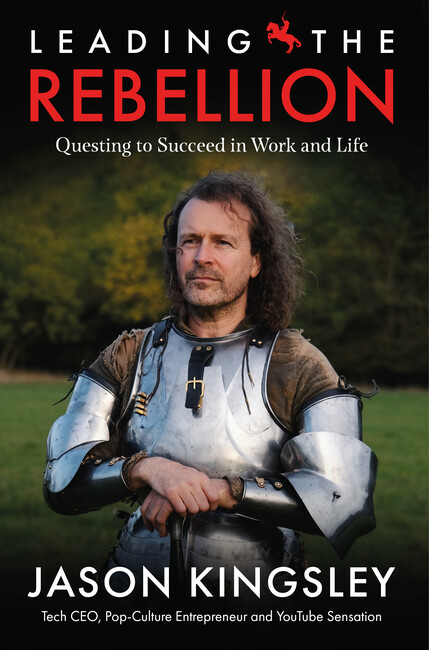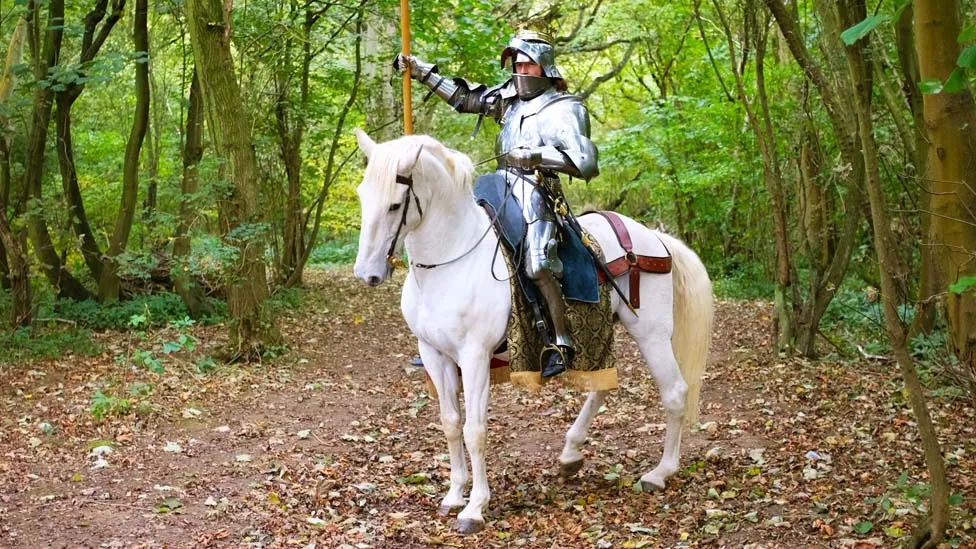"Leading the Rebellion": not what I was expecting.

The book Leading the Rebellion.
A book review of Leading the Rebellion
I find current self-proclaimed business leaders uninspiring. On reading that first sentence I expect you have someone in mind already. Either they’re obviously much better at self-promotion than analysis, they’ve got that one trick they keep using, or they’ve got that one great idea, but they keep building an artifice around it to keep attention focused on them. Or the worst perpetrators produce “productivity porn”, where they create a simple system that works for them and their context. Usually they’re something like a freelance writer or famous academic, with a simple set of tricks, with its simple snappy title, will fix your life too, if only you’ll follow their creed.
Leading the Rebellion looks like it would be something similar, with its subtitle of “Questing to Succeed in Work and Life” I assumed this would provide similar professional and personal guidance. As the kickstarter campaign explained: “Part business guide, part autobiography, part medieval reference on how the chivalric code can be applied to life and business success!”. The author is Jason Kingsley OBE, CEO of Rebellion, a leading British games publisher, book publisher, and film and TV production company.
Despite my usual aversion to that kind of self-help book I’ve been impressed by author Jason Kingsley’s approach in general, so encouraged by my partner I signed up on the Kickstarter for a hardback copy of the book.
The introduction takes us through the history of the term “chivalry”, and after some consideration Kingsley settles on twelve virtues, outlined by the Duke of Burgundy in the 14th Century, that he asserts are the easiest to apply to modern life:
- Faith
- Charity
- Justice
- Sagacity
- Prudence
- Temperance
- Resolution
- Truth
- Liberality
- Diligence
- Hope
- Valour
He takes us through his current understanding of each of these “knightly pillars” in a subsequent chapter, beginning with Faith. I quote from that chapter below:
Luckily, and even though medieval knights were all, at least on the surface, practicing Christians, the word ‘faith’ in the Chivalric Code did not have religious connotations. Chivalric faith meant fidelity rather than spirituality. It meant trust and integrity, a pledge to always be faithful to one’s promises no matter how big or small they were, and that’s a lesson which is equally applicable today. Keeping faith also means to battle onwards, no matter how hard the path is: to believe in yourself and those around you, to maintain your ambitions, get up if knocked down, to persist with your quest, remain honest to yourself about what you’re trying to achieve, to strive towards your goals and hope that your visions will succeed. In many ways, faith is what makes us work hard and progress: we need to believe that what we’re doing is worthwhile if we are really to enjoy our work.1
( note that I’ve linked to all the page numbers for quotes in footnotes, for those of you who have or plan to buy the physical version )
The tone of the book is set from the very first chapter, on Faith. As per the quote above, this is very insightful into medieval practice, and how medieval knights actually thought and behaved, rather than being filtered through more recent sensibilities. Beyond historical contexts the writing style is still very readable, but also occasionally “all over the place”. For example later in the same chapter Kingsley discusses Rebellion’s acquisition of the well known and well loved British comic 2000AD, and all the rights that go with it. But he then describes how he fell in love with the comic while eating particularly vinegary chips from a chip shop called The 300 Spartans, and wonders if the world would be a better place if all fish and chip shops were named after great battles.
So the thread of the text meanders, but in a very interesting and entertaining way. The next chapter, Charity, continues this method - as it starts with the concept of unconditional love for humanity and expecting the best of those around you, but extends that into a deep study of the author’s care for his horses, and the bond he develops with them. The topic of horses is only adjacent to the subject matter of the chapter, but I found this way of writing incredibly endearing. Also it makes for a much more enjoyable read than something more formal or prescriptive, where every chapter implies I immediately turn its teachings into an Action Plan to better myself or my life.

The CEO on a horse, in armour, as you do.
The book is full of thoughtful points that you wouldn’t expect. For example Kingsley rightly makes the point, often expressed in video gaming circles, of just how much the industry is worth, and the shallow studies that blame video games for teenage violence. But then he follows up immediately with arguing against E-sports being called “sports”, when the common point of view is the opposite:
In fairness, this reluctance to accept computer games’ rightful place in society comes from within the sector itself too. The entire retitling of ’e-sports’ seems to me to be unproductive and reeks of a collective lack of self-confidence. What’s wrong with calling them computer games? ‘E-sports’ is just social camouflage. They’re not sport, not really. Sport, in my opinion, should be physically demanding, requiring fitness, co-ordination and strength, and though you won’t find a greater champion of computer games than me, you also won’t find me banging the drum for them to be considered a sport. I get the rationale behind it, the very physical prowess which the word ‘sport’ implies allows gamers to ally themselves with those whose physical gifts make them socially venerated - but I still think it’s basically a theft of someone else’s valour, some verbal legerdemain, in the same way that ’the cloud’ gives the impression of something free floating, untethered and environmentally friendly rather than other people’s computers in a warehouse consuming vast quantities of electricity.2
Maybe I’m too online, but I’m used to this kind of leader, with a public opinion, either being an “adherent” or “contrarian”. I’m used to their opinions clearly falling all on one side or the other… or being some short pithy remark that feels weighty but contains nothing. In this case, I’m not sure I agree, but I think Kingsley’s point is not only very well made, but it has clearly been given a lot of thought.
Another example is this passage from a later chapter on Sagacity. I’ve chosen not to edit or shorten quotations taken from the book so you can appreciate how well points are made, and also what you - as the reader - are expected to bring to those thoughts. I don’t recall there being a single bullet pointed list of actions in the entire book. In-between the personal reflections and slightly left-field mental associations there are some really considered points in here:
I like to think that people who have done business with me once will do business with me again. An ultra-aggressive approach to business can help you win in the short term, depending on the nature of the power dynamic between you and them, but in the long term you burn bridges and eventually only the desperate will do deals with you as they have no option. People won’t be doing you little favours or nudging work in your direction, or casually mention in passing that you’re good to work with. So there’s little to no medium or long- term value in doing a deal where you’ve screwed the other side over. They might agree to your terms knowing that it’s their only option and then go bust anyway, they might cut corners on the specification to make it fit, they might deliberately but subtly sabotage the product without you knowing. You might not ever know they got their own back and what it cost you. It should be a win-win situation for both parties, or at least a fair enough fair enough situation. How much damage might you do to your own future prospects by behaving badly? If you do someone a favour they may well do you one back one day. Not always, of course - there are always those who’ll regard concessions as weakness, competitors as enemies and opportunities as potential for exploitation - but on balance there’s more to be gained by supporting and helping other people than by being dismissive.3
The wiser sales people and sales teams I’ve worked with have followed this approach, having realised it is far easier to build and maintain relationships with existing customers than constantly chase for new prospects. Especially as word of mouth is such a valuable way to be introduced to new customers, so your existing customers can sometimes do you marketing for you. And alternatively, in our modern environment, where communication with so many is so easy, a bad reputation can spread quickly and irrevocably.
In sales circles this is known as the The Sandler Methodology, and can be learnt through reassuringly expensive courses. Or you could read the quoted text above, maybe twice, and I think you’ve got most of what you need to know.
As I say, this is from the chapter on Sagacity, sagacity being the “twin capacity to understand and assess to see the truth of a situation and to know how best to use that to one’s own advantage.” 4 This whole chapter reinforces my bias for Kingsley’s way of working and thinking as it includes references to many of my favourite concepts, from Daniel Dennett’s deepities to humans’ propensity for finding patterns regardless of whether they’re there or not, to the magician’s “equivocation” method of bending any audience choice to their favour, to Dr. Richard Wiseman’s work on luck to Survivorship Bias and the dangers of learning lessons from those who remain to teach.

All pieces mentioning Survivorship Bias must include the "measles plane".
( if you’re not familiar with the idea of “Survivorship Bias” and the related story of the World War Two bomber armour do check out the Wikipedia page, where the significance of the “plane with a rash” will be explained )
Another good example of valuable business advice is the entire chapter on Prudence. Kingsley puts that term into a business context, advocating that money should be seen as a requirement and a reward, but shouldn’t be viewed as the sole reason for starting any endeavour. This chapter is really good as business advice, but you’ll need to work through it rather than looking for summary boxes or bullet points.
As the Prudence chapter continues, Kingsley moves onto considering the acquisition of money, and being mindful of your goals - and also on how unhappy and unnecessarily competitive the ultra wealthy are. This is solidly put, and Kingsley’s opinion comes from direct experience, whereas I firmly agree mainly based on a few TV documentaries. As with other parts of the book, the chapter kind of meanders to an end as Kingsley muses on how people are mainly shaped by their available opportunities. There’s no firm conclusion here, and there’s no call to action. But that’s very much the style of the book, you leave each chapter more thoughtful than when you began it.
The first time a chapter just kind of finished I was tempted to put it down to lack of editing: when the CEO of the company puts together a book of business advice, includes many auto-biographical elements, and publishes it through their own publishing arm, who’s going to step up and tell them what heartfelt statement needs cutting? But from a vague familiarity with Kingsley in general, mainly through occasionally seeing his YouTube channel, and from the overall tone of the book, I just don’t get that impression. This isn’t someone bestowing you with their grand knowledge, this is someone with experience giving you some things to think about, interspersed with references to their own life.
Similarly the chapter on Temperance isn’t a firm block of advice… it’s a chatty explanation of seeking balance in your life, especially but not solely in relation to work. Combined with this, due to its position in the book, is a “photo section” of colour pictures of Kingsley and his horses and his armour. It’s a nice touch.

Picture by Kasumi Kitano, hosted by the BBC.
The next chapter, chapter seven on Resolution, is much more structured. Kingsley brings out the best from those popular business thinkers I’d usually be more wary of, Bezos and Willink for example. This is a much more focused chapter on personal resilience, and on leadership. Of particular note is the tone he takes with, and what he takes from, Winston Churchill. This is a useful chapter, one I’ll definitely re-read, and the book is all the better for this being an exception to the usual tone. Kingsley actually spells out the word “Resolution” with the subjects of each sub-section in this chapter, and this might be the only time I’ve seen that acronym method work. I mean we’re 150 pages into an enjoyable one-sided conversation so I’m not going to be that objective, but still, I feel this works to make the needed points. Or, if you’re in the right position and profession, a chapter you could flick to as a daily reminder.
These highlights are just those sections that struck me, and to give you an idea of what to expect, especially the changes in tone. For example chapter ten: Diligence, is an informative read on the video games industry, very discursive and anecdotal as opposed to that much more formally structured Resolution. This is to the book’s advantage, and makes it a more interesting read - other business books can feel like the author decided on the formula and then just filled in the gaps for each subject; that’s certainly not the case here.
Kingsley has clearly thought about his subjects, and has adapted that thinking over time. Around page 190 he’s a fan of open offices not cubicles, which I’d disagree with from experience of both - but his points are well made and he thinks in context. Less than twenty pages later he’s extolling the benefits of online meetings, for example for industry group meetings and working on the book we’re reading. In general leaders seeking your attention would be firmly for one working solution regardless of the situation, there’s simply more to think about here. This is a micro-example of the book as a whole, Kingsley has thought about his subject and put that together into a format for you to learn from - but as a text to think on, rather than a list of principals to learn.

Pictures without armour are available, you'll have to find them yourself.
If I had to complain about something…
It’s a shame there’s no index here, the book really needs it as there’s such valuable insights here they should be easier to find. Interspersing those insights among auto-biographic tidbits and throw away anecdotes works really well, once you’re used to the format and know what you’re getting, but that does mean this loses a lot of reference value 5 if you haven’t bought a digital version you can search through.
Also I realise this is only partly a business book or reference book, but cited references would have been useful for all kinds of reasons. For example to the concept of deepities mentioned above. Or to specific facts - for example the use of “flu flu"arrows in medieval warfare to lure your enemy into lining up too close6, or the assertion that goalkeepers where fluorescent colours to lead a striker’s eyes to their jersey, and therefore their shot to where they’re looking7. Being able to see the evidence behind that, so it could be cited in future, would be so useful.
In summary
A title I considered and rejected for this review was “Maybe not the business leader you want, but the business leader you need”. I rejected that title because although the sentiment stands the book is so much wider than that. If you’re looking for an inspirational read, or an auto-biography, or a pleasant read, or business advice, this book is recommended.
How easy this is to read shouldn’t be under-estimated, Kingsley seems firm in his opinions but likeable - there’s some complexity to the concepts and obscurity to the references but its easy to digest. Writing as someone who struggles with the complexity of his own sentences or even paragraphs, at no point did I feel like I was reading a first draft, or that I should be impressed at elaborate trains of thought.
Kingsley stands as an example of someone who is smart, hard-working, personable, fair, and successful. We could all do with seeing more examples of that, and seeing less of the lucky people with insatiable egos. At the end of this book I was left with having had an enjoyable read, it didn’t feel like work or self-improvement. But having read it I am driven to push a little harder and be a little more confident. If you need that then do buy a copy.
Or if you know a budding entrepreneur, or even a successful one, buy them this book too.
-
This is from page 20 of the printed version, at the bottom of the page. ↩︎
-
This is from page 44 of the printed version, in the middle of the page. ↩︎
-
This is from page 81 of the printed version. ↩︎
-
These words can be found on page 79 of the hardback version, at the very start of the chapter on Sagacity. ↩︎
-
Of course, that’s partly why I’ve included the page numbers in this, so those parts that struck me most impactfully are easy for me to find again as well. ↩︎
-
This is mentioned on page 83. ↩︎
-
This is mentioned on page 104. ↩︎
